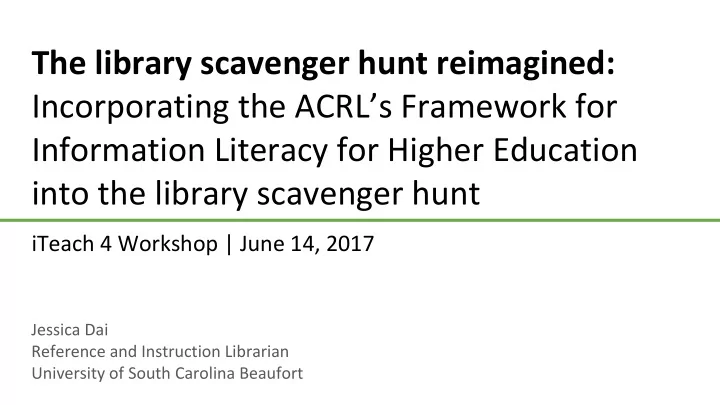

The library scavenger hunt reimagined: Incorporating the ACRL’s Framework for Information Literacy for Higher Education into the library scavenger hunt iTeach 4 Workshop | June 14, 2017 Jessica Dai Reference and Instruction Librarian University of South Carolina Beaufort
Library Yea scavenger or hunts nay?
• are the least effective way to introduce students to the library The cons • only work if carefully constructed • do not encourage critical thinking • ask students to locate random, obscure, or trivial McCain (2007) found information • fail to teach anything about the research process that librarians dissuade • have a negative impact on students’ confidence in using the library faculty and instructors • tend to promote learned helplessness from assigning • lack a clear, stated purpose • are quickly recognized by students as an exercise in futility scavenger hunts • often contain terminology the students do not understand • have no lasting value because scavenger • send the wrong message about how to do library research • are frustrating or overwhelming to students and library staff hunts: • are viewed as busy work that wastes students’ time • make librarians, not students, do most of the work • assume that students know how to do library research • cause students to resent having to do research in the library • may encourage cheating
Scavenger hunts in the library can... • be carefully constructed, • encourage critical thinking, • ask students to locate random, obscure, or trivial information, • & can teach students about the research process by... … transforming the scavenger hunt from a library orientation activity to a method of introducing first-year students to information literacy concepts.
So is it a scavenger hunt? ● Appropriated name as scavenger hunt evokes “fun” ● Might be more of a glorified worksheet using technology & requiring students to visit the library (optional) ● Rather than acquiring facts or bits of information, this reimagined scavenger hunt asks students to begin to acquire skills or adapt to a way of thinking
Background ● Received a request for a “fun” library workshop and created this rather quickly ● Piloted in Fall 2016 to two University 101 class ● Good instructor feedback and mixed student feedback ● Flexible ● Potential to do more ● Still a work in progress
Was the scavenger hunt fun? Scale of 1 (boring) to 5 (super fun):
Did you learn anything? * Other: “Easy bib is a good source”
Google Forms ● Free ● Easy to use and modify ● Records responses ○ Students don’t need to send/email/turn in work ● Quick assessment
The questions ● Mapped to the ACRL’s Framework for Information Literacy in Higher Education ● Open-ended ● Mimics the research process
Social media
Access ● Open access: ○ Scavenger Hunt: https://goo.gl/forms/sR8wkxagyuklfWax1 ○ Editable Scavenger Hunt: https://docs.google.com/forms/d/1P1KQWxh8UU8FTo_Z4e knrqcsFgkMPN-eQdP-2_SzZGs/edit?usp=sharing
Pros ● Adaptable ○ Format: in or out of class assignment ○ Questions ○ Device: smart phone, tablet, or desktop (depending on the assignment) ○ Individual or group work
Cons ● Might be more manageable in a smaller library ● If done as an out of class assignment, you would need to prep library staff ● Not really fun, after all ● Can be difficult to “boil down” certain aspects of the research question ○ Crafting a research question, for example
Lessons learned and next steps ● Reconsider use of iPads ● State objectives at the beginning ● Revise the “Crafting a research question” section ● Perhaps -- ○ Include incentives ○ Consider gathering everyone together to “break down” what they learned ○ Share findings amongst the class via a Google Doc, Evernote, Padlet, etc.
Questions?
Thanks!
References Aulisio, G. J. (2013). The heritage hunt: From start to update. Pennsylvania Libraries , 1 (1), 35. McCain, C. (2007). Scavenger hunt assignments in academic libraries: Viewpoints versus reality. College & Undergraduate Libraries , 14 (1), 19-31. Renner, B. R., Cahoon, E., & Allegri, F. (2016). Low-tech scavenger hunt model for student orientation. Medical Reference Services Quarterly , 35 (4), 372-387. Rugan, E. G., & Nero, M. D. (2013). Library scavenger hunts: The good, the bad, and the ugly. The Southeastern Librarian , 61 (3), 4.
Recommend
More recommend